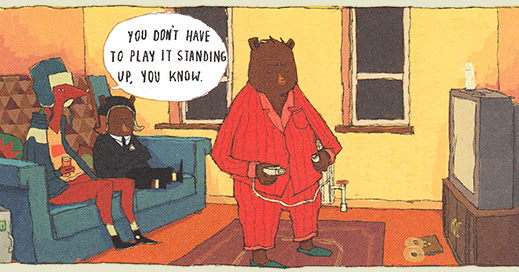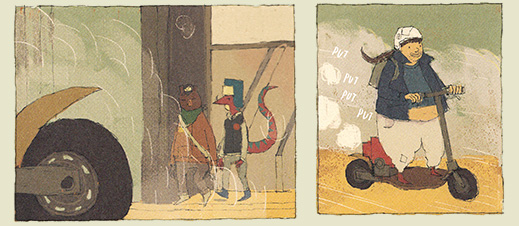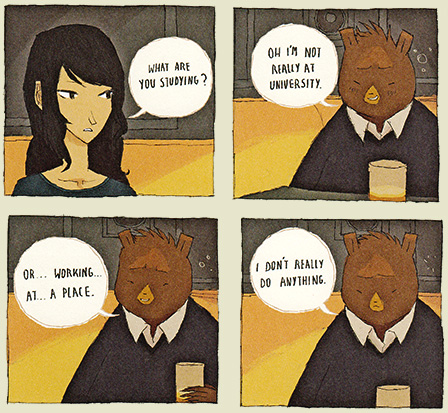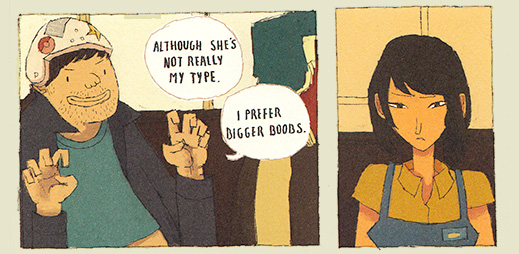The Adventures of Leeroy and Popo
I've talked briefly before about my probably apocryphal understanding of the history of talking animal comics. Zoomorphized humans (i.e., in these cases, humans made into bipedal animals who act in entirely human ways) have an astonishingly calcified place in the history of "legitimate" comics. I don't necessarily understand why—save for perhaps by glancing at the pet-owning citizenry out there who do their best to turn their dogs and cats into furry people. It's obviously a pretty popular side-genre. Disney helped destroy copyright law for all time just to be the only ones ever to be allowed use of a small stable of animalized humans.
I've never very well understood why particular stories are developed with animalized protagonists. I adore Usagi Yojimbo, but I've never quite apprehended why Usagi needed to be a rabbit. I'm not particularly certain that the book wouldn't still be wonderful if Usagi looked like the average dude from seventh-century Japan. I loved Carl Barks' Scrooge McDuck as a kid, but I never had any sense that the character was improved by being a duck.

I guess I can see how the bizarre-ness of animal protagonists can add to the absurdity of the humour found in something like Krazy Kat or Matt Groening's Life Is Hell (though The Simpsons pretty solidly proved Groening's brand could work outside the realm of animalized humans). I can also see how using the unique setting of an animal's natural environment could give a creator an interesting world to play in (cf. Watership Down and Mouse Guard). Most talking animal comics, however, don't take advantage of these perks and The Adventures of Leeroy and Popo is almost no exception. Almost.
Leeroy is the key figure in this narrative and Popo is his pretty stalwart mate. They're young twenty-somethings who could be in university, but aren't. Because they're really just kind of losers. They smoke blunts, mill about, play Wii, pine after ladies, and exclude losers more socially inept than themselves. They're not the worst sort of people. They're not as aggressively obnoxious as Rick, the guy they put minimal effort into avoiding, a grown kid who lives in a garage, stinks, and makes a nest of porn and strip clubs. But they're a curbslip away from such a fate. Still, they aren't exactly likable characters—and not likely the kind I'd care to spend a book with. But creator Louis Roskosch happens to do one thing that breaks down my resistance enough for me to hang out with his characters for awhile. He makes them animals.
Everyone in Leeroy and Popo is perfectly human except for Leeroy and Popo (and Leeroy's family, of whom we only see the younger brother Tyrone). Leeroy is a bearish human and Popo is a raptorish human. And these simple alterations to their physical appearance work a tremendous change over the tenor of the book.11For me at least. My wife was unconvinced and their animalistic presence left her mostly unaffected. Leeroy is suddenly softened, and rather than find him repellent my reaction turned to pity. The dissonance of seeing him as a bear allowed me the split-second of distraction needed to slip into his shoes for a moment or two.
They weren't comfortable shoes.

I don't know the reason why Leeroy is the way he is, but I suspect that just as he's one bad day from becoming Rick, the average kid who isn't particularly ambitious is a mere trip-slip-and-fall away from becoming Leeroy. If it weren't for good friends and healthy social connections,22and an indomitable will I might have pretty easily become something in the realm of Leeroy or Popo. Especially in the dire months after my first break-up. (I actually looked probably something not far off from a skinny Leeroy at the time—it's amazing how much having someone affectionate believe in you can resurrect you into a kind of contented near-coolness.)
Being able to spend time with Leeroy and have my revulsion wheeled back for a time allowed me to witness some of the pair's qualities as well as their more obvious deficits. Leeroy and Popo are good to each other. They need each other. And while they've both a bit of the social misfit to them, they each offer the other kindnesses that help to keep them human and valuable—even if sometimes only marginally. Or at least Popo does this for Leeroy. Leeroy's a bit too self-concerned and made anxious by the crush of love to think about others at just this moment. (Fair enough!)
 This is one of those pivotal "nosce te ipsum" moments—
This is one of those pivotal "nosce te ipsum" moments—
that will probably pass by entirely unheeded
The Adventures of Leeroy and Popo is, in its brief span of pages, concerned with two friends sitting under the assault of a social world that is, quite frankly, beyond them. And with what will happen when one of them tries to scratch his way out from the dome under which the two have been trapped for so long. As Leeroy takes tentative steps toward living more fully that life he's carved out for himself and engaging the human society around him, the reader is met with the anxiety that comes with watching anyone take earnest risks. We may cheer his victories and we may mourn his losses, but in the end we'll only be able to empathize so far as we sense that the two are truly human figures. And somewhat ironically, by making the two into beasts, Roskosch allowed their humanity to shine through for me.
If there's one bit that feels off for me, it's not the art, which is coloured in a nostalgic palette of bright earths. Instead, I stumbled a bit over the melodramatic typicality of some of the characters. Rick is not just a loser, he's a massive loser—he's fat, doesn't wear clothes that remotely fit, has food stains all over, smells, wears a helmet indoors, and is grossly inappropriate at all times. Cecilia is played as that kind of untrustworthy woman who leads a loser along, all the while only doing so as part of the game between her and another guy. They're common conventions and they're of course boring for it, but simultaneously they're so common that they may stand in for whole stories that readers can simply file away as the background noise that informs the lead characters' type of existence. In any case, I didn't appreciate that so much as I might have.
 Cecelia is, rightly, not amused
Cecelia is, rightly, not amused
Whether their story meets a happy or tragic end is up to reader interpretation and values, but at the least I'd be interested to see where their lives and decisions might take them in at least the immediate future. Will they build on their successes and learn from their failures? Or will they simply sublimate, dragged down by the more nefarious, more deleterious elements of their social sphere? Anyone's guess at this point, so I hope Roskosch feels moved to continue these characters' journeys.
Good Ok Bad features reviews of comics, graphic novels, manga, et cetera using a rare and auspicious three-star rating system. Point systems are notoriously fiddly, so here it's been pared down to three simple possibilities:
3 Stars = Good
2 Stars = Ok
1 Star = Bad
I am Seth T. Hahne and these are my reviews.
Browse Reviews By
Other Features
- Best Books of the Year:
- Top 50 of 2024
- Top 50 of 2023
- Top 100 of 2020-22
- Top 75 of 2019
- Top 50 of 2018
- Top 75 of 2017
- Top 75 of 2016
- Top 75 of 2015
- Top 75 of 2014
- Top 35 of 2013
- Top 25 of 2012
- Top 10 of 2011
- Popular Sections:
- All-Time Top 500
- All the Boardgames I've Played
- All the Anime Series I've Seen
- All the Animated Films I've Seen
- Top 75 by Female Creators
- Kids Recommendations
- What I Read: A Reading Log
- Other Features:
- Bookclub Study Guides











